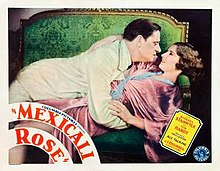
Barbara Stanwyck was an American actress, model and dancer. A stage, film, and television star, during her 60-year professional career she was known for her strong, realistic screen presence and versatility. She was a favorite of directors, including Cecil B. DeMille, Fritz Lang, and Frank Capra, and made 85 films in 38 years before turning to television.

Ball of Fire is a 1941 American screwball comedy film directed by Howard Hawks and starring Gary Cooper and Barbara Stanwyck. The Samuel Goldwyn Productions film concerns a group of professors laboring to write an encyclopedia and their encounter with a nightclub performer who provides her own unique knowledge. The supporting cast includes Oscar Homolka, S. Z. Sakall, Henry Travers, Richard Haydn, Dana Andrews, and Dan Duryea.
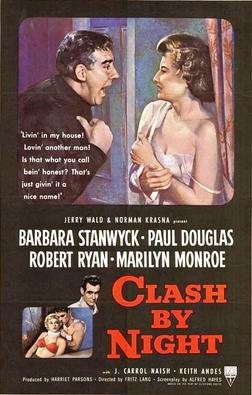
Clash by Night is a 1952 American film noir drama directed by Fritz Lang and starring Barbara Stanwyck, Paul Douglas, Robert Ryan, Marilyn Monroe and Keith Andes. The film is based on the 1941 play by Clifford Odets, adapted for the screen by writer Alfred Hayes. It is the first major film to credit Monroe before the title, albeit with fourth billing.

Jeopardy is a 1953 American crime drama directed by John Sturges. The black-and-white film stars Barbara Stanwyck and Barry Sullivan as a married couple, and Ralph Meeker as an escaped convict. The film was based on the 22-minute radio play "A Question of Time".
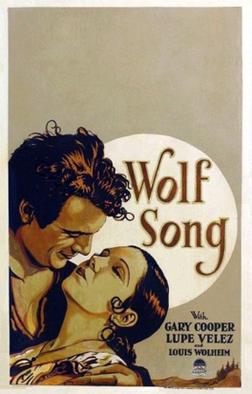
Wolf Song is a 1929 American sound part-talkie Western romance film directed by Victor Fleming and starring Gary Cooper and Lupe Vélez. While the film has a few sequences with dialog, the majority of the film featured a synchronized musical score with sound effects using both the sound-on-disc and sound-on-film process.

The Man with a Cloak is a 1951 American film noir crime-thriller-drama directed by Fletcher Markle and starring Joseph Cotten, Barbara Stanwyck, Louis Calhern, and Leslie Caron, and based on "The Gentleman from Paris", a short story by John Dickson Carr.

The Miracle Woman is a 1931 American pre-Code drama film directed by Frank Capra and starring Barbara Stanwyck, David Manners, and Sam Hardy. Based on the play Bless You Sister by John Meehan and Robert Riskin, the film is about a clergyman’s daughter who becomes disillusioned by the mistreatment of her dying father by his church. Having grown cynical about religion, she teams up with a con man and performs fake miracles for profit. The love and trust of a blind veteran, however, restores her faith in God and her fellow man. The Miracle Woman was the second of five film collaborations between Capra and Stanwyck. Produced and distributed by Columbia Pictures, the film was reportedly inspired by the life of Aimee Semple McPherson.
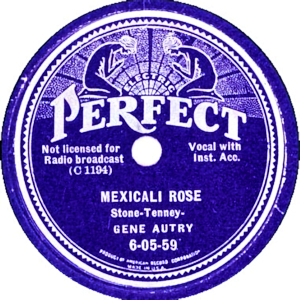
"Mexicali Rose" is a popular song composed by bandleader and pianist Jack Breckenridge Tenney in the early 1920s, when he and his seven piece orchestra played the hotels and clubs of the Calexico and Mexicali border. The song became a hit in the mid-1930s, thanks to Gene Autry and Bing Crosby, around the same time that Tenney became a lawyer and was elected to the California State Assembly. Tenney was later appointed to head of the California Senate Factfinding Subcommittee on Un-American Activities.
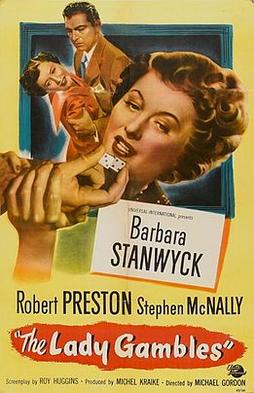
The Lady Gambles is a 1949 American film noir drama film directed by Michael Gordon and starring Barbara Stanwyck, Robert Preston and Stephen McNally.

Forbidden is a 1932 American pre-Code melodrama film directed by Frank Capra and starring Barbara Stanwyck, Adolphe Menjou, and Ralph Bellamy. An original story inspired by the 1931 novel Back Street by Fannie Hurst, with a screenplay by Jo Swerling, the film is about a young librarian who falls in love with a married man while on a sea cruise.
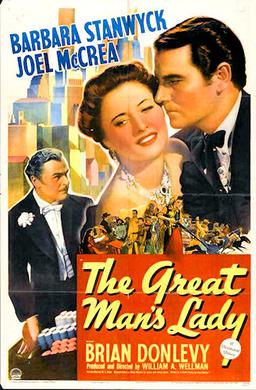
The Great Man's Lady is a 1942 American Western film directed by William A. Wellman and starring Barbara Stanwyck and Joel McCrea. It is based on the short story "The Human Side" by Viña Delmar.

The Locked Door is a 1929 American pre-Code drama film directed by George Fitzmaurice, and starring Rod LaRocque, Barbara Stanwyck, William "Stage" Boyd and Betty Bronson. It is based on the 1919 play The Sign on the Door by Channing Pollock. The play was first adapted for the screen in 1921 as The Sign on the Door, starring Norma Talmadge. It was Stanwyck's first starring role and first talking film.
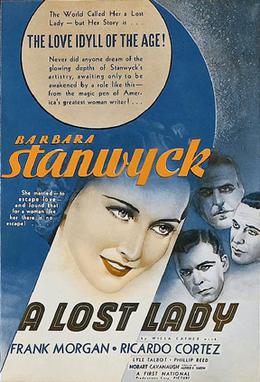
A Lost Lady is a 1934 American drama film directed by Alfred E. Green and starring Barbara Stanwyck, Frank Morgan and Ricardo Cortez. It is based on the 1923 novel A Lost Lady by Willa Cather, with a screenplay by Gene Markey and Kathryn Scola. Warner Bros. had produced a 1924 silent film based on the story, starring Irene Rich.
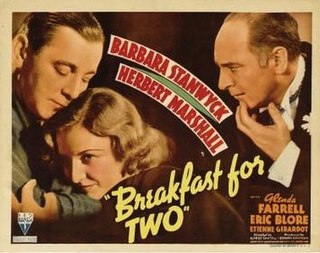
Breakfast for Two is a 1937 American screwball comedy film directed by Alfred Santell and starring Barbara Stanwyck, Herbert Marshall and Glenda Farrell. The film was produced and distributed by RKO Pictures, but was a commercial failure for the studio. Stanwyck and Marshall worked together once more, immediately following this film, on the 20th Century-Fox drama Always Goodbye (1938).
Red Salute is a 1935 American comedy film directed by Sidney Lanfield and starring Barbara Stanwyck and Robert Young. Based on a story by Humphrey Pearson, the film is about the daughter of a US Army general who becomes involved with a suspected communist agitator.
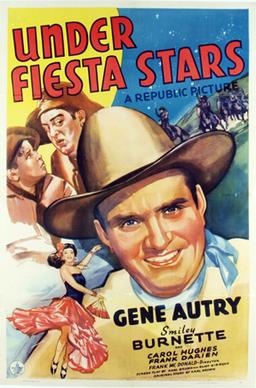
Under Fiesta Stars is a 1941 American western film directed by Frank McDonald and starring Gene Autry, Smiley Burnette, and Carol Hughes. Based on a story by Karl Brown, the film is about a singing cowboy and rodeo champion who inherits a ranch and mining property along with his foster father's niece. She wants to sell but needs his consent, and he wants to work the mine according to his foster father's wishes. Problems arise when the niece unwittingly gets involved with unscrupulous lawyers who are plotting to steal the mine. The film features the songs "Purple Sage in the Twilight", "When You're Smiling", and the title song.
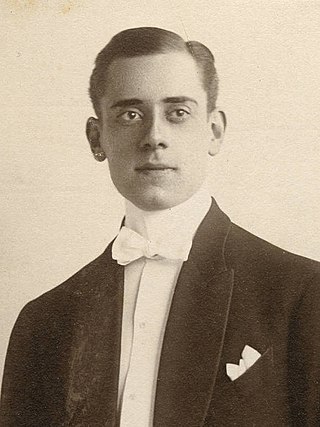
Samuel B. Hardy was an American stage and film actor who appeared in feature films during the silent and early sound eras.

Illicit is a 1931 American pre-Code drama film directed by Archie Mayo and starring Barbara Stanwyck, James Rennie, Ricardo Cortez, and Natalie Moorhead. Based on a play by Edith Fitzgerald and Robert Riskin, the film is about a young couple living together out of wedlock because the woman does not believe in marriage. When they finally get married, both become unfaithful to each other. Illicit was produced and distributed by Warner Bros.
Mexicali Rose may refer to:
Call of the Forest is a 1949 American Western film directed by John F. Link and starring Robert Lowery, Ken Curtis, Chief Thundercloud, Black Diamond and Charlie Hughes. It was also known as The Flaming Forest and Untamed.
